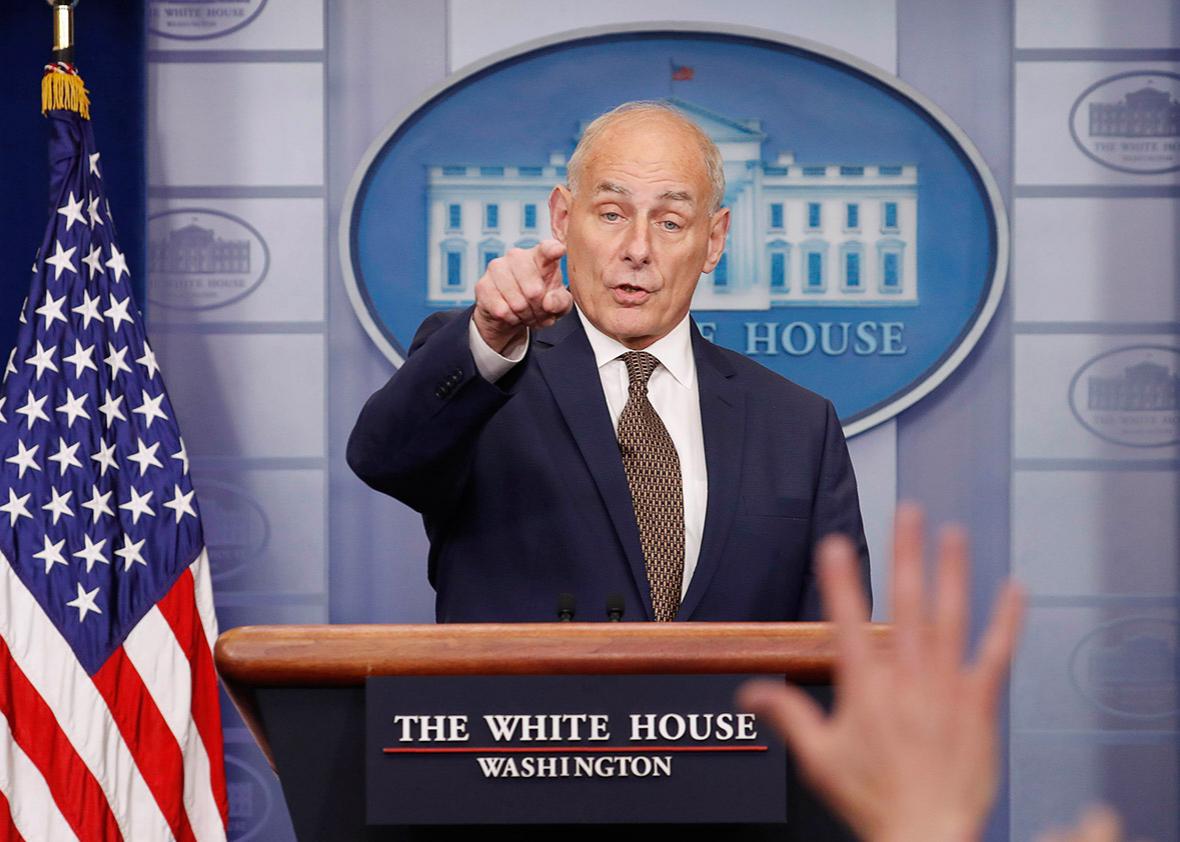President Trump has botched nearly everything. Even Sen. Bob Corker, a former ally, laments that “the White House has become an adult day care center.” Now Trump’s chief of staff, Gen. John Kelly, is acknowledging the president’s incompetence. At a White House briefing on Thursday, Kelly tried to reassure the press and the public about his boss. Instead, Kelly inadvertently confirmed that he and other aides are struggling to protect Trump from himself.
Here are three key moments from the briefing.
Question: You said you’re not so frustrated that you’re thinking of leaving. But are you frustrated?
Kelly: No, I’m not frustrated. This is really, really hard work running the United States of America. I don’t run it, but I’m working for someone who is dedicated to serving the country in the way that he’s talked about for a number of years.
The question was about Kelly’s job, not Trump’s. Kelly replies that running the country is hard but that he’ll stay in the job. Then, realizing his mistake, he says he’s not the one running it. But even as Kelly tries to scrub his gaffe, he conveys how he sees their relationship: Trump supplies a layman’s general direction—“serving the country in the way that he’s talked about for a number of years”—and Kelly does the rest.
Question: And do his tweets make your job more difficult?
Kelly: No. No. I mean, the job of the chief of staff is to staff the president, give him the best advice or go get the best advice I can give him, help him consume advice, help him work through the decision-making process in an informed way. But that’s my job, and that’s what I do.
It’s normal to advise the president. It’s not normal to say you help him “consume” advice and “work through the decision-making process in an informed way.” No one speaks that way about a competent boss. It’s like saying you help your kid chew food. Nor would you tack on the phrase Kelly adds here—“in an informed way”—unless your boss had an obvious deficiency at seeking and digesting information.
Question: I have a question about the tweets that’s a big part of this administration. Do they get you by surprise? And are they official statements?
Kelly: I read in the paper—well, you all know, you write it—that I’ve been a failure at controlling the president or a failure at controlling his tweeting and all that. Again, I was not sent in—or, I was not brought to this job—to control anything but the flow of information to our president so that he can make the best decisions.
I have found that Mr. Trump, from the day I met him, does not—he’s a decisive guy. He’s a very thoughtful man, I should say. He takes information in from every avenue he can receive it. I restrict no one, by the way, from going in to see him. But when we go in to see him now, rather than onesies and twosies, we go in and help him collectively understand what he needs to understand to make these vital decisions. So again, I was not sent in to—or brought in—to control him, and you should not measure my effectiveness as a chief of staff by what you think I should be doing. But simply, the fact is, I can guarantee to you that he is now presented with options, well thought-out options. Those options are discussed in detail with his team, and then he comes up with the right decision.
Let’s start with the phrase “I was not sent in.” Kelly corrects it to “brought.” But within seconds, he blurts out again that he wasn’t “sent in” to do more than control the information flow.
Put yourself in Kelly’s shoes. Imagine that you got your job because Trump called you into his office and asked you to take the job. Why would you repeatedly use the phrase “sent in” to describe your hiring? You wouldn’t. “Sent in” implies that the initiative to put you in the job came from outside.
The other telling line is: “He’s a very thoughtful man, I should say.” Why interject that? And why blurt out that you’re saying it because you should? The answer is: It’s not true. A president who needs to be spoon-fed “well thought-out options,” and who needs meetings with lots of aides to “help him collectively understand what he needs to understand to make these vital decisions,” isn’t particularly thoughtful. Kelly is groping for a definition of thoughtful that fits Trump. At one point in the briefing, he says of the president: “He’s deep in thought, to say the least, about the way ahead in Iran.” In this White House, thoughtfulness means that a man who isn’t good at thinking, and doesn’t like to think, is being asked to do so.
It’s not surprising to hear that Trump is ignorant, obtuse, hardheaded, slow-witted, undisciplined, and checked out. These defects have been manifest for years. What’s surprising is to see such indictments reflected in the words of the president’s chief of staff. Kelly didn’t mean to confirm them, of course. They came out obliquely, and then Kelly tried to clean them up. That’s how you know they’re true.
